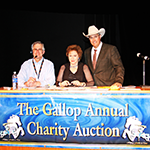As
summer approaches there are so many things to look forward to, the longer days,
warmer weather and all the different Youth World Championships for each breed.
As temperatures rise, sometimes the stress and pressure of competition will
have tempers flaring up faster than a Johnsonville Brat on a charcoal grill.
Here’s a newsflash – it doesn’t have to be that way! With some simple tools and
a little planning you can be as cool as a cucumber in the heat of the battle.
It’s
all in the set up
If you
want your family to function more like the Cleavers than the Bickersons, this
is for you. Prior to your next event, plan a family meeting and make a list of all
of the things that need to be done in order to get your horse and rider team from
the stall to the show pen, Next, with the precision of a Project Manager, you are
going to decide who is going to do what and when. Now is also the time to decide
the rules for social events and curfew times if applicable. The purpose of this
plan is to set expectations in the peace and comfort of your living room. If you
find that this meeting creates a bit of tension, and requires facilitation by Judge
Judy, just imagine negotiating things like this during a show!
Let’s
use the Cleaver Family as an example:
- Wally:
Clean tack day before show starts
- Beaver:
Saddle horse 30 minutes before first class
- June:
Put numbers on pad 30 minutes before first class
- Ward: Wash tail 20 minutes after class
The
beautiful thing about this is once everyone agrees upon who is doing what, they
also agree that there is no need to ask if it has been done, and there is no renegotiation
of tasks after they have been assigned. Setting expectations up front and
agreeing to them as a team means that nagging, eye rolling and foot stomping
are out and harmony, smiling and happiness are in.
Focus on performance, not on outcome
Having
a goal like winning the All Around Saddle is noble, but unfortunately, an outcome
goal like this can create massive amounts of stress and pressure. A better
approach is to focus on one specific behavior that will yield the biggest improvement,
and make that the goal. This small but powerful tool known as a performance
goal, is a great confidence booster because it is specific, measurable and
within a riders control. Some examples of performance goals might be keeping
the proper leg or hand position in an equitation class, making smooth
transitions in a rail class, or remembering a trail pattern. As a family, and with
your trainer if possible, you will want to discuss and gain agreement on what the
goal for the specific class or show is, and measure success by the achievement
of that goal, not the overall performance. Warning: Performance goals have side
effects. Studies show that achieving performance goals may eliminate stress,
increase performance and can produce All-Around Saddles, Buckles or things of a
similar nature, so use frequently for best results.
“You did great, honey! Let me give Sparky his
carrot now”
Now I
don’t know about you, but when someone asks if I would like some ‘constructive
criticism’ I often find that it isn’t very constructive and it is mostly criticism.
Prior to the show, it is important to decide will be offering these words of
wisdom during warm-ups and after each class. If you have a trainer, I suggest leaving
this to the professionals and let them handle it. Your job is to listen and pet
the horse. If you hear something that you don’t understand or agree with, take
responsibility and talk privately with the trainer about it. Having a united front
based on mutual respect for everyone involved will eliminate drama and create
an environment that supports world class performance. If you don’t have a
trainer, then the best scenario would be for your son or daughter to let you know
how they thought they did and what they can do to improve as it relates to the
performance goal for that class. You can give them some feedback, keeping it
brief, positive and focusing on what they did well and what they might consider
doing to be even better next time. Then smile, hug your wonderful child, and give
Sparky his carrot.
If they really mess up, they feel bad
Trust
me. Even as a 49 year old with flirting dangerously close to the Select Division,
nobody has to tell me when I screw up. I already know it, I feel badly about
it, and I use all of my sport consultant skills to move forward and it isn’t always
easy. You don’t need to add fuel to the fire by reminding your kids about mistakes,
and knowing that you may get upset and angry about their performance just
creates more pressure. The most important thing to remember is; it isn’t about
whether a person makes a mistake, it is about having a decent recovery strategy
so when something goes haywire, there won’t be a meltdown. Learning from
mistakes is the best way to get better, so be understanding if something goes
wrong. If you are the type of parent that can be a bit verbal in the moment,
you may want to give yourself a little time out until you can be part of the
solution and not part of the problem. Humor and Ice Cream are two good strategies
to use in certain situations. Demonstrating a true attitude of ‘OK, so what did
you learn” will allow kids to quickly admit what they did wrong, learn from it,
and develop a game plan so that history doesn’t repeat itself.
Accountability – Make it Personal
One of
the nice things about having your son or daughter involved with horses is that
they will learn about responsibility, caring for something other than themselves
and along the way, they may develop a good work ethic and sense of pride and
personal responsibility. On the other hand, they could learn to think that
appearance is more important than performance. It is up to you to be a good
role model by teaching them that they are responsible for their results. It isn’t
the horse, judge or trainers fault if something goes wrong and it certainly isn’t
about having the most expensive saddle or outfit. If you look closely, those really
nice saddles are on very nice horses ridden by very competent riders that spend
t a lot of time and energy working on being the best they can be.
Performance
will always speak for itself, and if you truly think that it is all about expensive
tack and outfits then you might consider riding English or switching to timed
events. Enough said – I’m getting off my soapbox now.
Perspective and Purpose
We can
all get wrapped up in the chase for points and prizes, but it is important to
maintain the right perspective. You spend a lot of time, money, and energy so your
kids can show. At the end of the day, it’s important to reconnect with why you
are doing this in the first place and remind yourself that it’s only a horse show.
Regardless of how you did at this one, you are headed to another one next
weekend, so you might as well enjoy the ride!
Kirsten Farris is a Certified Sport Consultant, Certified Equestrian
Fitness Trainer, and the Author of The Workbook for the Equestrian
Athlete- A Guide to Showring Success. For more information contact her
at: [email protected]
© 2010









